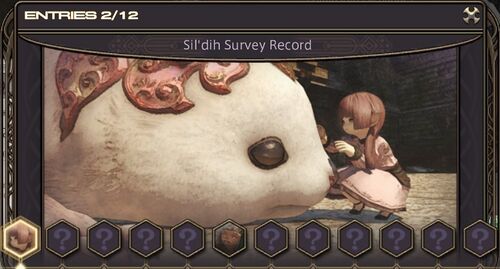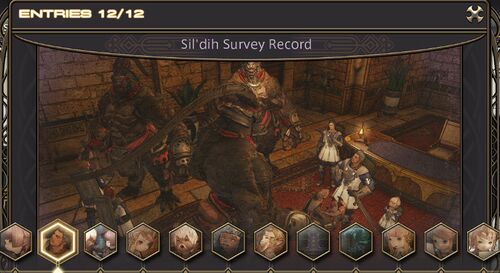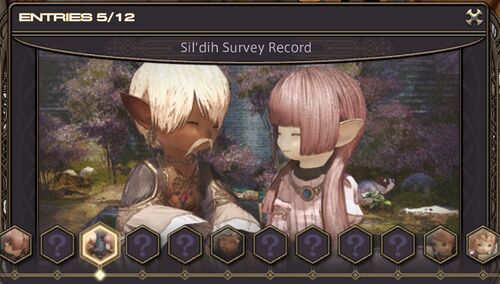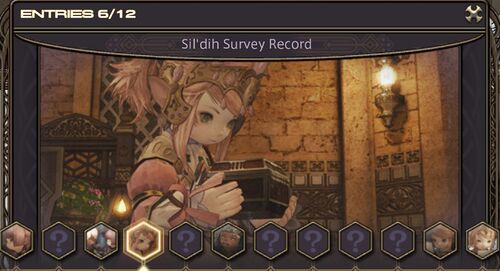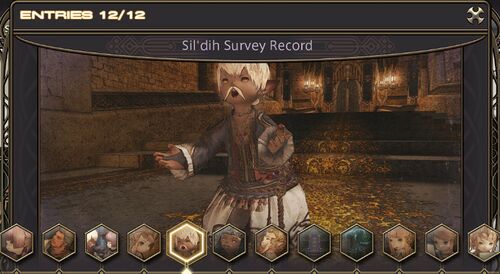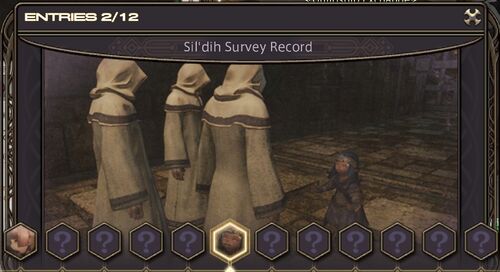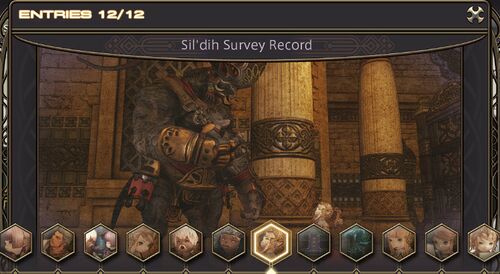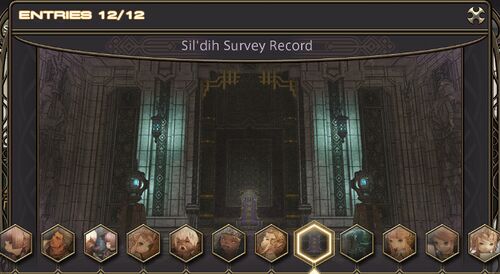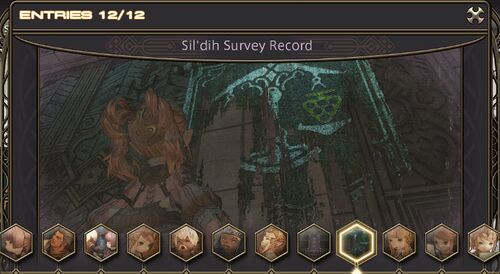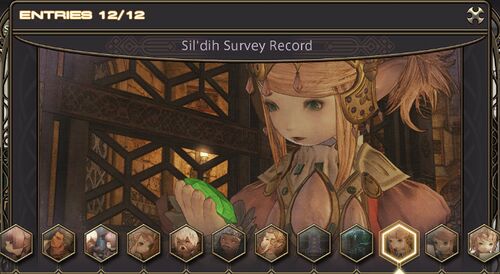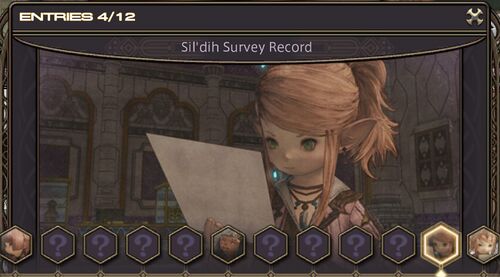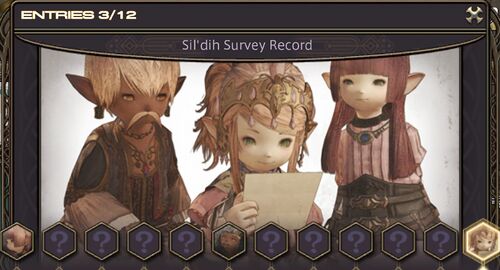Difference between revisions of "Sil'dih Survey Record"
ArcaneFocus (talk | contribs) (Created page with "The Sil'dih Survey Record is a series of short lore excerpts about The Sil'dihn Subterrane, unlocked as the player clears different paths of the dungeon. There are twelve...") |
|||
| (12 intermediate revisions by 3 users not shown) | |||
| Line 1: | Line 1: | ||
The Sil'dih Survey Record is a series of short lore excerpts about | {{see also|Mount Rokkon Exorcism Record|Aloalo Island Conservation Record}} | ||
The '''Sil'dih Survey Record''' is a series of short lore excerpts about {{questlink|vdungeon|The Sil'dihn Subterrane}}, unlocked as the player clears different paths of the dungeon. | |||
There are twelve entries in total to unlock. | There are twelve entries in total to unlock. | ||
==Entries== | ==Entries== | ||
===Whom the Silkie Serves=== | |||
[[File:SildihSurveyReportEntry1.jpg|thumb| 500 px]] | |||
{{Quotation|Entry 1 of 12|What a surprise to learn that the old palace silkie was a creation of Mother's! The discovery impelled me to pursue the topic with [[Papashan]], who, of anyone besides Father, knew my mother best of all. Naturally, I was circumspect in my inquiries, lest he become aware of my subterranean explorations. | |||
With fond remembrance, Papashan spoke of Mother's penchant for cleaning--a habit she refused to surrender even after taking up residence in the royal chambers. Her ladies-in-waiting were positively scandalized, and hid away every brush and broom that the sultana's hands not be sullied by common grime. Denied the usual tools of sanitation, Mother retaliated by employing a Sharlayan tutor, whereby she acquired the arts necessary to manifest a massive, mouselike familiar. Ingrained with an obsessive dislike of dirt, this arcane entity would even corner the palace guards to scrub spots from their armor--to the great amusement of the household staff. Then one day, without fanfare, the sikie was simply gone. | |||
I suspect the cause of its disappearance lay in the deepening conflict with the Monetarists; with less and less time to slip away from the palace, Mother likely set her familiar to protect and maintain the secret garden in her absence. Yet what a stubborn and willful soul she was! To create a servant for cleaning is one thing, but to imbue it with such unbridled power is quite another!}} | |||
===Pride and Acceptance=== | |||
[[File:SildihSurveyReportEntry2.jpg|thumb| 500 px]] | |||
{{Quotation|Entry 2 of 12|With a mind to prepare for future explorations, I begin trawling through the palace archives in search of documents with even a tangential mention of [[Sil'dih]]. For the most part, however, the shelves held little in the way of new information. The only account to snare my attention was that of the Ul'dahn soldier, who had written of his experience fighting alongside the [[Amalj'aa]] during the zombie purge. His report touched upon the different approach his new allies took to warfare, and how those differences impeded their cooperative efforts. | |||
It was said that the undead which flooded the waterways were beyond counting, and varied wildly in individual strength. The most effective strategy, or so this soldier believed, was to focus their efforts on the weaker zombies, and thus whittle the horde down to a more manageable size. Not so the Amalj'aa. When presented with the choice, the proud warriors would always seek to slay the mightiest enemies first. This display of superiority, they explained to the exasperated Ul'dahn, was the best way to wage war. To do otherwise-to begin engagement with the lesser foe-would cast doubt upon one's martial prowess. | |||
'Twould seem they learned to respect each other's reasoning, yet ultimately fought their battles as their peoples preferred. The Ul'dahn soldier returned to his former tactic, targeting the weakest undead for his initial assaults. An interesting point of culture, mayhap, but a helpful one? That remains to be seen.}} | |||
===A Spot in the Sunlight=== | |||
[[File:SildihSurveyReportEntry3.jpg|thumb|500 px]] | |||
{{Quotation| Entry 3 of 12| He, a member of the royal family. She, the daughter of a modest merchant house. They met at a palace banquet--an opportunity to mix with the notables of commerce--and it was love at first sight. Ah, I adore that story-- 'tis so very romantic. Mother would go on to tell me of the secluded place her and Father would visit ere they were bound in marriage; of a sun-dappled garden at the end of a secret tunnel, where they could enjoy each other's company away from prying eyes and judgmental stares. In other words, a perfect description of the sanctuary we discovered on our recent foray.<br>When they did at last announce the details of their engagement, the location of this magical place where Father proposed to Mother became the subject of much rumor and debate. I am told that the city's merchants, being the same incorrigible creatures then as they are now, seized upon this furor to turn a tidy profit. They never did come close to the truth of it, but after visiting the spot myself, 'tis easy to see why it has remained undisturbed. I imagine the two of them in their younger years, whiling away an idle morning amidst the dawn-kissed petals, their haven protected beneath a barrier of Thanalan's scorching sand, and I cannot help but smile. Never until now have I managed to think of them without a pang of sadness. Have I been captive to grief for so very long...?}} | |||
===A Key Memory=== | |||
[[File:SildihSurveyReportEntry4.jpg|thumb|500 px]] | |||
{{Quotation|Entry 4 of 12|On my fifth nameday, my parents gifted me with a key wrought in silver--but not the knowledge of what it opened. "When you are a woman grown, we will take you to the precious place this key protects," Mother had explained. Father had nodded saying it was "where slumbers the memories which neither we, nor Ul'dah, should ever forget." I, a child of five, understood only that I was being forced to wait for my true present. Oh, how I had sulked and fumed back then! Yet now I cling to that fading recollection with desperate fingers, like a failed merchant to her dwindling coinpurse.<br>'Twas too soon after when Mother and Father were called away to Thal's eternal halls. Their sudden absence left me hollow and dazed; my ascension to the throne followed by torturous days of uncertainty steeped in sorrow. It seemed I stumbled across the desert, the sands burning one moment, freezing the next. All thought of keys and secret places were cast aside, forgotten. Why had they entrusted such a portentous gift to a daughter so young? Had they foreseen the "accident" which would befall them? Or had some other factor influenced their actions? Their true intentions are lost to time. There is only one thing I can know for certain: that the key was left in my hands for good reason.}} | |||
===In Father's Stead=== | |||
[[File:SildihSurveyReportEntry5.jpg|thumb| 500 px]] | |||
{{Quotation|Entry 5 of 12|The Amalj'aa constructed Zahar'ak when they came to join Ul'dah in purging the undead infestation from the subterrane. And if Zahar'ak was their main war camp, then the old fortifications we passed through would have served as a forward base. The question, then, is why did my parents gift me the means to visit these rusted defenses? In my late father's possessions was a diary which made reference to "irrefutable evidence of the alliance"-mayhap there is more to the place we have yet to discover. | |||
In life, Father was a staunch opponent of the edict to banish the so-called "beast tribes". Arrayed against him were the Monetarists, who sought to preserve their special concessions and privileges by ousting their competitors. 'Twas with the backing of the Syndicate that they overruled the sultan's will, and forced their proposal into law. Unwilling to concede defeat, Father intended to take the battle to the court of public consensus. His weapons would not be easily forged documents or records, but physical proof of the Amalj'aa contribution to Ul'dah's continued prosperity. Then the "accident" happened, ending his plans to appeal for harmony ere they could truly begin. | |||
Which brings us back to this mention of evidence. I know not what form it might take, or indeed, if it yet even exists, but should a thorough search of that forgotten base provides us with clues... We are on the cusp of brokering a lasting peace with the Amalj'aa-if I can but discover this elusive proof, then the aspirations Father had for our nation may finally become a reality.|}} | |||
===Ul'dah's Sin to Bear=== | ===Ul'dah's Sin to Bear=== | ||
[[File:SildihSurveyReportEntry6.jpg|thumb|500 px]] | |||
{{Quotation| Entry 6 of 12| When that Amalj'aa champion burst forth from his casket, the blood nigh froze within my veins. He must have suffered injury during the purge, the zombie corruption finding its way into his flesh... | {{Quotation| Entry 6 of 12| When that Amalj'aa champion burst forth from his casket, the blood nigh froze within my veins. He must have suffered injury during the purge, the zombie corruption finding its way into his flesh... | ||
| Line 13: | Line 45: | ||
This deceit was upheld by a desire to preserve not only the Ul Dynasty's authority, but also the standing of the Order of Nald'thal-- an institution deeply entwined with thaumaturgical practices. And it can be said that few Ul'dahns would wish to accept that their home was built upon the corpse of a city so brutally slain by their forebears. Yet without a clear view of the past, we cannot be sure of our course for the future. The sight of that rotting Amalj'aa hero was all too stark a reminder: as a sultana of the House of Ul, I bear responsibility for my ancestor's atrocities. And though we suffer for the truth, even as Ishgard did for hers, the time has come to set the records aright.|}} | This deceit was upheld by a desire to preserve not only the Ul Dynasty's authority, but also the standing of the Order of Nald'thal-- an institution deeply entwined with thaumaturgical practices. And it can be said that few Ul'dahns would wish to accept that their home was built upon the corpse of a city so brutally slain by their forebears. Yet without a clear view of the past, we cannot be sure of our course for the future. The sight of that rotting Amalj'aa hero was all too stark a reminder: as a sultana of the House of Ul, I bear responsibility for my ancestor's atrocities. And though we suffer for the truth, even as Ishgard did for hers, the time has come to set the records aright.|}} | ||
===To Learn More of Myrrh=== | |||
[[File:SildihSurveyReportEntry7.jpg|thumb| 500 px]] | |||
{{Quotation|Entry 7 of 12|I wished to consult with the Amalj'aa over a certain facet of out expedition, yet I could hardly bring up the subject during one of our regular councils. Should it become known that the royal person had been slipping out of the palace to conduct secret investigations, then my trusted escort would be caught up in an unpleasant storm of repercussions. Nay, I must be discrete. As such I approached the Amalj'aa war chief at meeting's end, and engaged him with the usual empty pleasantries-eventually steering the conversation to tribal custom. I explained that the coffin of a zombie-cursed warrior had been discovered within Ul'dahn territory, and wondered at the traditional rites one might perform to send his kin's unfortunate soul on to the afterlife. | |||
Somewhat taken aback, the war chief advised that it was of paramount importance to avoid disturbing the warrior's undead slumber. "Leave the coffin untouched," he warned. Stand facing the valorous spirit, and perform a single bow. Offer your respects for a life well lived, celebrate the warrior's greatest victory, and then kneel in a moment of reflection". | |||
Thus did the Amalj'aa mourn comrades fallen on the field of battle, burning myrrh incense at the culmination of the ritual to guide their sanctified souls unto the everlasting flame. In receiving his answer, I was suddenly struck by a cavalcade of questions I had never thought to ask. I felt ashamed at my ignorance, and am now resolved to learn more of this proud people's culture.}} | |||
===Ul'dah and Sil'dih=== | |||
[[File:SildihSurveyReportEntry8.jpg|thumb| 500 px]] | |||
{{Quotation|Entry 8 of 12|When [[Belah'dia]] splintered into Ul'dah and Sil'dih, the division only deepened with time. The history books tell the tale of escalating hostilities; of how the advent of the Trader's Spurn devastated the Sil'dihns, and brought the conflict to a horrific end. Ul'dah would later migrate to the site of the fallen metropolis, where even now the ruins of the past dot the landscape, or lie hidden from view deep underground. Such remnants proved useful when routing the municipal waterways, and so did they refer to this section of the subterrane as the "Sil'dihn aqueducts". Given that the war turned savage over water sources, it seems to me a designation of particularly ghoulish sensibilities. | |||
Distasteful naming aside, it should have come as no surprise that these old tunnels fed into other vestiges of Sil'dih. And yet I was wholly unprepared to set foot in the royal palace itself! Had the structure been exposed above ground, the wind-driven sand coupled with the heat of the Thanalan sun would have led to extensive erosion. But cocooned beneath the earth as it was, its chambers have been perfectly preserved. How rare it must be to encounter ruins in such an unspoiled state. It will provide our historians with a wealth of material to study... assuming they can navigate the intervening passages. We must clear the way, first and foremost, and secure a safe path through.}} | |||
===Raising the Flags=== | |||
[[File:SildihSurveyReportEntry9.jpg|thumb| 500 px]] | |||
{{Quotation|Entry 9 of 12|When we came across the banner of Sil'dih, so alike to our Ul'dahn flag, I was reminded that the first sultans of those warring nations were twin brothers. Yet the reason behind the design's similarity has naught to do with sibling imitation. In Belah'dia's time, 'twas the Flame of Magic and the Fruit of Knowledge which sat the scales of judgment. Ul'dah took the Flame as its own, balancing the scales with the Gem of Affluence, whilst Sil'dih claimed the Fruit, and set it against the Helm of Might. Each thought himself the rightful heir, and thus did both raise flags depicting the bounties of Belah'dia. | |||
Both included a symbol of strength, but the difference lay in its interpretation" Ul'dah believed in the potency of its magicks; Sil'dih, in its military might. The gladiators who train in our Coliseum are mayhap the closest embodiment of Sil'dihn philosophy. In fact, reflecting on the encounter now, the fierce gladiator construct lurking in the palace depths could not have been a more apt incarnation of beliefs: from the exquisite embossment of grapes upon its formidable helm, to the way its gleaming form-the same silvery hue as Sil'dih's scales-Illuminated the subterranean gloom. Through all these years did it stand patient guard, faithfully serving a master centuries dead, and a nation long since fallen into ruin. 'Tis enough to turn one's mood melancholy.}} | |||
===My Mother's Eyes=== | |||
[[File:SildihSurveyReportEntry10.jpg|thumb| 500 px]] | |||
{{Quotation|Entry 10 of 12|How, in the name of the Nald'thal, did that burglar manage to creep into a treasure chamber sealed off from the outside world for generations? Aside from the gate only my key could open, I saw no other means of entering the ruins. Although considering the prevalence of secret doors and passages in its construction, the remnants may very well have oher entrances of which I am simply not aware. Yet in spite of this mystery, I find myself lingering most on the scrawled note our thief left behind. The first item was an obvious reference to "Nashachite", which must somehow relate to one of the ruins' many riddles. 'Tis how it relates to me, however, that truly has my thoughts in a jumble. | |||
Nashachite was the name Ul'dahnjewelers gave to the high-quality malachite excavated from the reopened [[Copperbell Mines]]. This was after the Calamity, of course, and thus I took umbrage at these merchants using my late mother's name as a means to promote their wares. And then I was presented with a sample. 'Twas as if the gentle sparkle of Mother's eyes was captured within the stone. Much to my chagrin, I found myself forced to agree that "Nashachite" was the perfect fit for this gem of exquisite green.}} | |||
===The Thorne Legacy=== | |||
[[File:SildihSurveyReportEntry11.jpg|thumb|500 px]] | |||
{{Quotation|Entry 11 of 12|''"Sil'dih aqueducts. Thorne. Vault."'' I noticed these words scribbled on the back of the burglar's not we found, but was too preoccupied to give them much thought at the time. Did the intruder believe that a secret cache of Thorne riches was to be found somewhere in the waterways? An odd notion, given that the House of thorne was well known for its honesty and integrity. After all, 'twas a sultan of their dynasty who willingly transferred power back to the House of Ul, and there was nary a peep to imply they had any wrongful withdrawals from the royal treasury. Assuming they had secreted wealth in some hidden location, it would have been done with the full cooperation of the Ul family--with the particulars passed down to successive sultans. Father would have known of the arrangement, and he ''did'' speak of slumbering memories which should not be forgotten. Was this one of those things my parents wished me to see when I came of age?<br>I have considered a hundred potential scenarios for what they might have meant, each more fanciful than the last. And although the Sil'dihn palace was indeed an eye-opening discovery, I sense that Father alluded to a matter of even deeper import...}} | |||
===In Parchment We Trust=== | |||
[[File:SildihSurveyReportEntry12.jpg|thumb|500 px]] | |||
{{Quotation|Entry 12 of 12|Deep beneath Ul'dah, beyond the twisting tunnels of the Sil'dihn aqueducts, we have discovered a vault in which slumbers a precious legacy. In its center, a catalog of evidence emblazoned with the words: "For coin, country, and comrades-in-arms, we bequeath this trust to the House of Ul." <br>This solemn declaration, signed by the last sultan of Thorne, was followed by several pages of florid signatures--a procession of Ul'dahn rulers which ends with the name of my own father. And wedged there, betwixt one page and the next, a faded missive penned in his distinctive hand. <br>Addressed with the hope that the reader be "our darling Nanamo," the letter describes the purpose of the vault. 'Tis a place known only to the royal heirs; a secure archive wherein evidence of Ul'dah's alliance with the Amalj'aa is preserved. And though tradition dictated that this trust be passed on by word of mouth, Father felt that, should worst come to worst, 'twas safer to have an explanation committed to parchment. <br>''"Dearest Nanamo, we wonder what manner of woman you have become. We know the role of sultana will challenge you in myriad ways, but no matter how your rule unfolds, remember that you shall ever be our greatest achievement. Seize what happiness you may each day, for joy is worth more than all the gil in Ul'dah."'' <br>Mother. Father. Be assured that 'tis not sorrow which causes these tears to fall, but overwhelming pride. Now, in this moment, I am simply happy to be your daughter.|}} | |||
[[Category:Lore/Books and Documents]][[Category:Ul'dah]] | |||
Latest revision as of 19:25, 31 October 2023
The Sil'dih Survey Record is a series of short lore excerpts about ![]() The Sil'dihn Subterrane, unlocked as the player clears different paths of the dungeon.
The Sil'dihn Subterrane, unlocked as the player clears different paths of the dungeon.
There are twelve entries in total to unlock.
Entries
Whom the Silkie Serves
“What a surprise to learn that the old palace silkie was a creation of Mother's! The discovery impelled me to pursue the topic with Papashan, who, of anyone besides Father, knew my mother best of all. Naturally, I was circumspect in my inquiries, lest he become aware of my subterranean explorations.
With fond remembrance, Papashan spoke of Mother's penchant for cleaning--a habit she refused to surrender even after taking up residence in the royal chambers. Her ladies-in-waiting were positively scandalized, and hid away every brush and broom that the sultana's hands not be sullied by common grime. Denied the usual tools of sanitation, Mother retaliated by employing a Sharlayan tutor, whereby she acquired the arts necessary to manifest a massive, mouselike familiar. Ingrained with an obsessive dislike of dirt, this arcane entity would even corner the palace guards to scrub spots from their armor--to the great amusement of the household staff. Then one day, without fanfare, the sikie was simply gone.
I suspect the cause of its disappearance lay in the deepening conflict with the Monetarists; with less and less time to slip away from the palace, Mother likely set her familiar to protect and maintain the secret garden in her absence. Yet what a stubborn and willful soul she was! To create a servant for cleaning is one thing, but to imbue it with such unbridled power is quite another!
— Entry 1 of 12
Pride and Acceptance
“With a mind to prepare for future explorations, I begin trawling through the palace archives in search of documents with even a tangential mention of Sil'dih. For the most part, however, the shelves held little in the way of new information. The only account to snare my attention was that of the Ul'dahn soldier, who had written of his experience fighting alongside the Amalj'aa during the zombie purge. His report touched upon the different approach his new allies took to warfare, and how those differences impeded their cooperative efforts.
It was said that the undead which flooded the waterways were beyond counting, and varied wildly in individual strength. The most effective strategy, or so this soldier believed, was to focus their efforts on the weaker zombies, and thus whittle the horde down to a more manageable size. Not so the Amalj'aa. When presented with the choice, the proud warriors would always seek to slay the mightiest enemies first. This display of superiority, they explained to the exasperated Ul'dahn, was the best way to wage war. To do otherwise-to begin engagement with the lesser foe-would cast doubt upon one's martial prowess.
'Twould seem they learned to respect each other's reasoning, yet ultimately fought their battles as their peoples preferred. The Ul'dahn soldier returned to his former tactic, targeting the weakest undead for his initial assaults. An interesting point of culture, mayhap, but a helpful one? That remains to be seen.
— Entry 2 of 12
A Spot in the Sunlight
“He, a member of the royal family. She, the daughter of a modest merchant house. They met at a palace banquet--an opportunity to mix with the notables of commerce--and it was love at first sight. Ah, I adore that story-- 'tis so very romantic. Mother would go on to tell me of the secluded place her and Father would visit ere they were bound in marriage; of a sun-dappled garden at the end of a secret tunnel, where they could enjoy each other's company away from prying eyes and judgmental stares. In other words, a perfect description of the sanctuary we discovered on our recent foray.
When they did at last announce the details of their engagement, the location of this magical place where Father proposed to Mother became the subject of much rumor and debate. I am told that the city's merchants, being the same incorrigible creatures then as they are now, seized upon this furor to turn a tidy profit. They never did come close to the truth of it, but after visiting the spot myself, 'tis easy to see why it has remained undisturbed. I imagine the two of them in their younger years, whiling away an idle morning amidst the dawn-kissed petals, their haven protected beneath a barrier of Thanalan's scorching sand, and I cannot help but smile. Never until now have I managed to think of them without a pang of sadness. Have I been captive to grief for so very long...?— Entry 3 of 12
A Key Memory
“On my fifth nameday, my parents gifted me with a key wrought in silver--but not the knowledge of what it opened. "When you are a woman grown, we will take you to the precious place this key protects," Mother had explained. Father had nodded saying it was "where slumbers the memories which neither we, nor Ul'dah, should ever forget." I, a child of five, understood only that I was being forced to wait for my true present. Oh, how I had sulked and fumed back then! Yet now I cling to that fading recollection with desperate fingers, like a failed merchant to her dwindling coinpurse.
'Twas too soon after when Mother and Father were called away to Thal's eternal halls. Their sudden absence left me hollow and dazed; my ascension to the throne followed by torturous days of uncertainty steeped in sorrow. It seemed I stumbled across the desert, the sands burning one moment, freezing the next. All thought of keys and secret places were cast aside, forgotten. Why had they entrusted such a portentous gift to a daughter so young? Had they foreseen the "accident" which would befall them? Or had some other factor influenced their actions? Their true intentions are lost to time. There is only one thing I can know for certain: that the key was left in my hands for good reason.— Entry 4 of 12
In Father's Stead
“The Amalj'aa constructed Zahar'ak when they came to join Ul'dah in purging the undead infestation from the subterrane. And if Zahar'ak was their main war camp, then the old fortifications we passed through would have served as a forward base. The question, then, is why did my parents gift me the means to visit these rusted defenses? In my late father's possessions was a diary which made reference to "irrefutable evidence of the alliance"-mayhap there is more to the place we have yet to discover.
In life, Father was a staunch opponent of the edict to banish the so-called "beast tribes". Arrayed against him were the Monetarists, who sought to preserve their special concessions and privileges by ousting their competitors. 'Twas with the backing of the Syndicate that they overruled the sultan's will, and forced their proposal into law. Unwilling to concede defeat, Father intended to take the battle to the court of public consensus. His weapons would not be easily forged documents or records, but physical proof of the Amalj'aa contribution to Ul'dah's continued prosperity. Then the "accident" happened, ending his plans to appeal for harmony ere they could truly begin.
Which brings us back to this mention of evidence. I know not what form it might take, or indeed, if it yet even exists, but should a thorough search of that forgotten base provides us with clues... We are on the cusp of brokering a lasting peace with the Amalj'aa-if I can but discover this elusive proof, then the aspirations Father had for our nation may finally become a reality.
— Entry 5 of 12
Ul'dah's Sin to Bear
“When that Amalj'aa champion burst forth from his casket, the blood nigh froze within my veins. He must have suffered injury during the purge, the zombie corruption finding its way into his flesh...
The Trader's Spurn was concocted by Ul'dahn thaumaturges, and employed by the reigning sultan during our war with Sil'dih. Sasagan III even knowingly propagated the fiction that it was the Sil'dihns who devised this abhorrent alchemy in an effort to turn their own citizens into undying soldiers. An accusation from the House of Thorne saw Sasagan III later punished for his heinous acts, and thus ended the first Ul Dynasty. His Lies, however, would live on to become accepted history.
This deceit was upheld by a desire to preserve not only the Ul Dynasty's authority, but also the standing of the Order of Nald'thal-- an institution deeply entwined with thaumaturgical practices. And it can be said that few Ul'dahns would wish to accept that their home was built upon the corpse of a city so brutally slain by their forebears. Yet without a clear view of the past, we cannot be sure of our course for the future. The sight of that rotting Amalj'aa hero was all too stark a reminder: as a sultana of the House of Ul, I bear responsibility for my ancestor's atrocities. And though we suffer for the truth, even as Ishgard did for hers, the time has come to set the records aright.
— Entry 6 of 12
To Learn More of Myrrh
“I wished to consult with the Amalj'aa over a certain facet of out expedition, yet I could hardly bring up the subject during one of our regular councils. Should it become known that the royal person had been slipping out of the palace to conduct secret investigations, then my trusted escort would be caught up in an unpleasant storm of repercussions. Nay, I must be discrete. As such I approached the Amalj'aa war chief at meeting's end, and engaged him with the usual empty pleasantries-eventually steering the conversation to tribal custom. I explained that the coffin of a zombie-cursed warrior had been discovered within Ul'dahn territory, and wondered at the traditional rites one might perform to send his kin's unfortunate soul on to the afterlife.
Somewhat taken aback, the war chief advised that it was of paramount importance to avoid disturbing the warrior's undead slumber. "Leave the coffin untouched," he warned. Stand facing the valorous spirit, and perform a single bow. Offer your respects for a life well lived, celebrate the warrior's greatest victory, and then kneel in a moment of reflection".
Thus did the Amalj'aa mourn comrades fallen on the field of battle, burning myrrh incense at the culmination of the ritual to guide their sanctified souls unto the everlasting flame. In receiving his answer, I was suddenly struck by a cavalcade of questions I had never thought to ask. I felt ashamed at my ignorance, and am now resolved to learn more of this proud people's culture.
— Entry 7 of 12
Ul'dah and Sil'dih
“When Belah'dia splintered into Ul'dah and Sil'dih, the division only deepened with time. The history books tell the tale of escalating hostilities; of how the advent of the Trader's Spurn devastated the Sil'dihns, and brought the conflict to a horrific end. Ul'dah would later migrate to the site of the fallen metropolis, where even now the ruins of the past dot the landscape, or lie hidden from view deep underground. Such remnants proved useful when routing the municipal waterways, and so did they refer to this section of the subterrane as the "Sil'dihn aqueducts". Given that the war turned savage over water sources, it seems to me a designation of particularly ghoulish sensibilities.
Distasteful naming aside, it should have come as no surprise that these old tunnels fed into other vestiges of Sil'dih. And yet I was wholly unprepared to set foot in the royal palace itself! Had the structure been exposed above ground, the wind-driven sand coupled with the heat of the Thanalan sun would have led to extensive erosion. But cocooned beneath the earth as it was, its chambers have been perfectly preserved. How rare it must be to encounter ruins in such an unspoiled state. It will provide our historians with a wealth of material to study... assuming they can navigate the intervening passages. We must clear the way, first and foremost, and secure a safe path through.
— Entry 8 of 12
Raising the Flags
“When we came across the banner of Sil'dih, so alike to our Ul'dahn flag, I was reminded that the first sultans of those warring nations were twin brothers. Yet the reason behind the design's similarity has naught to do with sibling imitation. In Belah'dia's time, 'twas the Flame of Magic and the Fruit of Knowledge which sat the scales of judgment. Ul'dah took the Flame as its own, balancing the scales with the Gem of Affluence, whilst Sil'dih claimed the Fruit, and set it against the Helm of Might. Each thought himself the rightful heir, and thus did both raise flags depicting the bounties of Belah'dia.
Both included a symbol of strength, but the difference lay in its interpretation" Ul'dah believed in the potency of its magicks; Sil'dih, in its military might. The gladiators who train in our Coliseum are mayhap the closest embodiment of Sil'dihn philosophy. In fact, reflecting on the encounter now, the fierce gladiator construct lurking in the palace depths could not have been a more apt incarnation of beliefs: from the exquisite embossment of grapes upon its formidable helm, to the way its gleaming form-the same silvery hue as Sil'dih's scales-Illuminated the subterranean gloom. Through all these years did it stand patient guard, faithfully serving a master centuries dead, and a nation long since fallen into ruin. 'Tis enough to turn one's mood melancholy.
— Entry 9 of 12
My Mother's Eyes
“How, in the name of the Nald'thal, did that burglar manage to creep into a treasure chamber sealed off from the outside world for generations? Aside from the gate only my key could open, I saw no other means of entering the ruins. Although considering the prevalence of secret doors and passages in its construction, the remnants may very well have oher entrances of which I am simply not aware. Yet in spite of this mystery, I find myself lingering most on the scrawled note our thief left behind. The first item was an obvious reference to "Nashachite", which must somehow relate to one of the ruins' many riddles. 'Tis how it relates to me, however, that truly has my thoughts in a jumble.
Nashachite was the name Ul'dahnjewelers gave to the high-quality malachite excavated from the reopened Copperbell Mines. This was after the Calamity, of course, and thus I took umbrage at these merchants using my late mother's name as a means to promote their wares. And then I was presented with a sample. 'Twas as if the gentle sparkle of Mother's eyes was captured within the stone. Much to my chagrin, I found myself forced to agree that "Nashachite" was the perfect fit for this gem of exquisite green.
— Entry 10 of 12
The Thorne Legacy
“"Sil'dih aqueducts. Thorne. Vault." I noticed these words scribbled on the back of the burglar's not we found, but was too preoccupied to give them much thought at the time. Did the intruder believe that a secret cache of Thorne riches was to be found somewhere in the waterways? An odd notion, given that the House of thorne was well known for its honesty and integrity. After all, 'twas a sultan of their dynasty who willingly transferred power back to the House of Ul, and there was nary a peep to imply they had any wrongful withdrawals from the royal treasury. Assuming they had secreted wealth in some hidden location, it would have been done with the full cooperation of the Ul family--with the particulars passed down to successive sultans. Father would have known of the arrangement, and he did speak of slumbering memories which should not be forgotten. Was this one of those things my parents wished me to see when I came of age?
I have considered a hundred potential scenarios for what they might have meant, each more fanciful than the last. And although the Sil'dihn palace was indeed an eye-opening discovery, I sense that Father alluded to a matter of even deeper import...— Entry 11 of 12
In Parchment We Trust
“Deep beneath Ul'dah, beyond the twisting tunnels of the Sil'dihn aqueducts, we have discovered a vault in which slumbers a precious legacy. In its center, a catalog of evidence emblazoned with the words: "For coin, country, and comrades-in-arms, we bequeath this trust to the House of Ul."
This solemn declaration, signed by the last sultan of Thorne, was followed by several pages of florid signatures--a procession of Ul'dahn rulers which ends with the name of my own father. And wedged there, betwixt one page and the next, a faded missive penned in his distinctive hand.
Addressed with the hope that the reader be "our darling Nanamo," the letter describes the purpose of the vault. 'Tis a place known only to the royal heirs; a secure archive wherein evidence of Ul'dah's alliance with the Amalj'aa is preserved. And though tradition dictated that this trust be passed on by word of mouth, Father felt that, should worst come to worst, 'twas safer to have an explanation committed to parchment.
"Dearest Nanamo, we wonder what manner of woman you have become. We know the role of sultana will challenge you in myriad ways, but no matter how your rule unfolds, remember that you shall ever be our greatest achievement. Seize what happiness you may each day, for joy is worth more than all the gil in Ul'dah."
Mother. Father. Be assured that 'tis not sorrow which causes these tears to fall, but overwhelming pride. Now, in this moment, I am simply happy to be your daughter.— Entry 12 of 12
